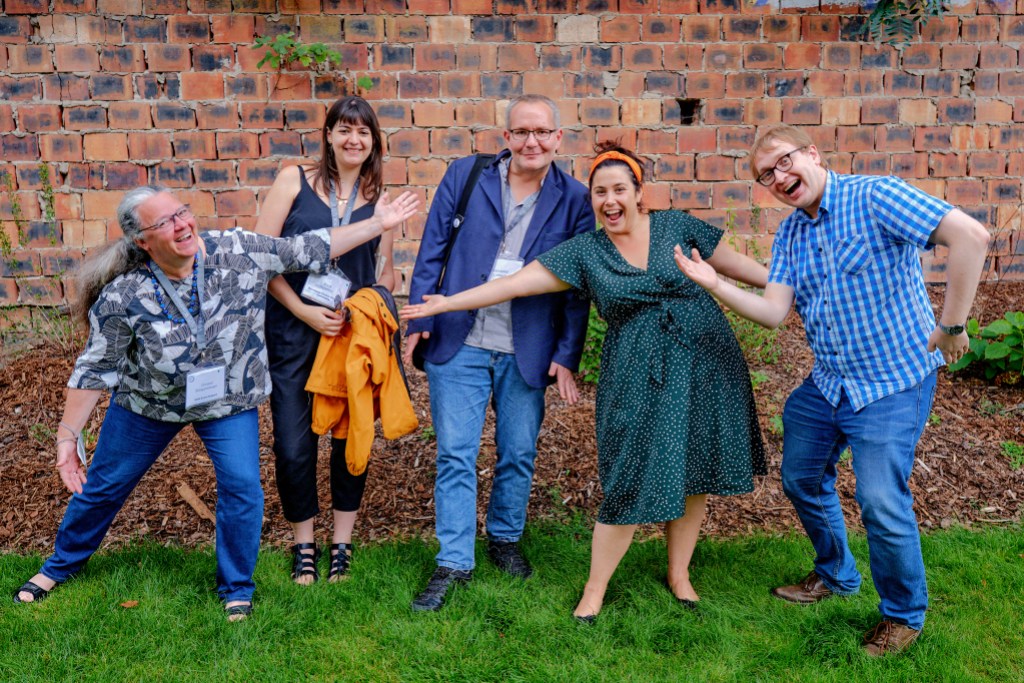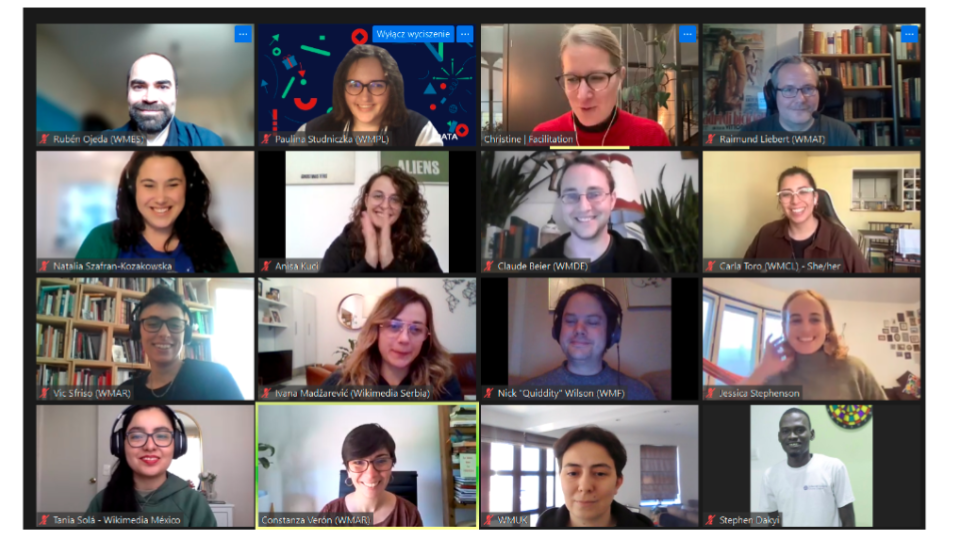It was during Wikimania in London in 2014, when Wikimedians working in community support decided that they would like to cooperate closer, in a more organized way. This is how the Volunteer Supporters Network (VSN) came to life. For the last 8 years it has been connecting Wikimedians from different parts of the wikiverse, whose activities are centered around supporting communities and volunteers. It supported communication around the topic, organized training and workshops, created and shared resources.
These kinds of collaboration and knowledge transfer support around a certain topic of expertise are similar to the work of the new units in the Wikimedia movement: the thematic hubs. Hubs have been designed during the Wikimedia 2030 strategy process. The idea behind them is to have structures that support more than one community. Some of them are centered around a special region and some – around a certain topic. Like volunteer support!
So in that case is the Volunteer Supporters Network a hub? And if yes: what would that mean in practice? The VSN decided to experiment with the idea and for one year acted as if it was a thematic hub.

So what did “working as a hub” mean exactly?
For the whole 2022, the Volunteer Supporters Network, supported by the Movement Strategy Implementation Grants and coordinated by Wikimedia Austria and Wikimedia Poland, worked as a hub. This work included working on the internal structure of the network, organizing a global Wikidata competition, a series of skill sharing sessions, peer support activities and – many more. During the project VSN took part in different global conversations about hubs, aiming to share their experience along the way. Overall it provided skillshare to about 300 participants (with topics varying from Central Notice Banners to post-events surveys), organized a global competition for 979 unique users, and grew and strengthened as a network.
But let’s finally jump into the lessons learned!
Unsurprisingly the year of activities brought a lot of learning which could be useful for other global networks, especially hubs. Below you will find a simplified overview of some of them, but if you want to dive deeper into learning, context and data – you should read the full report!

So what has the VSN learned?
- Know and publish your participation and decision-making structure as early as possible.
For many years the Volunteer Supporters Network didn’t have a clear structure and a decision making process. It sometimes was difficult to understand who can join the network and on what terms it happens. So one of the first steps was to create those regulations. Deciding on those things early is important: the later it happens, the more the status quo is already settled and needs to be taken into account. The rules don’t need to be complicated: simple are enough, the important thing is to have them publicly published and include a procedure of how those rules can be changed, so that they can evolve with the entity. - Aim for inclusion based on equity: participatory consultation processes when necessary, centralized administration, communication and infrastructure decisions when possible.
From the start VSN wanted all changes related to the future of the hub to happen through an open, flexible and equitable consultation process. To assure that, it worked with different participation formats, used both group and individual invitations and prolonged consultation time when needed. But at the same time the network knew that time (especially volunteer time) is one of the most precious resources in the movement, so it should be handled very carefully. What worked best for the VSN was consulting the big issues and centralizing the minor ones (like administration or infrastructure). - Build on what you already have.
The VSN hub activities were built on a network that has been in the Movement for many years. This made it easier to know what skills are already in the network, and engage people in different activities. You may not have a ready network, but you for sure have some contacts which may start one. Look through the history of your topic area or network and see what has already been done, who has been active – what are the foundations you can build on. - Complex multi-stakeholder projects implemented by a Hub can and should meet a wide variety of stakeholder needs.
And sometimes those needs were not initially the aim of the project. It showed perfectly during the global Wikidata competition organized by the VSN. This competition connected many affiliates, which participated for very different reasons. For some it was about learning, for others about getting content and for others – about supporting the community. A project was created in a way that all could benefit. - Be time-zone inclusive. And remember that people have different roles.
VSN is a global network, spanning through different time zones. It also connects volunteers who prefer to meet after work and staff members who prefer to have their meetings during work hours. Organizing meetings in a way that everyone can participate required some additional effort and organizing crucial meetings twice, at different times. This might not be the case for your network, but before organizing, be sure to know your audience and their needs around meetings. - Be aware that it takes time. Quite a lot of it!
And speaking about time – it takes quite a lot of it to curate a network. The coordination only took about 524 hours through the year. Which makes an equivalent of 13 weeks of F/T staff needed only for project management work (and not counting participation in activities of the hub-like skill-sharing sessions). That can be quite a lot of time, especially for volunteers. And this is why you need to… - …share responsibilities!
Wikimedia is a team sport – we thrive in collaboration! So whenever you can, share responsibilities and internal knowledge with a wider group of people. This will not only help you to share the workload, but will also support the stability of the project in case someone needs to step away from the project for personal or professional reasons.
What will happen next?
The VSN has a lot of plans: 2023 will bring even more skill sharing, peer support, and networking. This time coordinated by Wikimedia Argentina and Wikimedia UK, and with support from Wikimedia Austria, Wikimedia Deutschland and Wikimedia Foundation staff. There is a lot to wait for. And while waiting, you can read the whole learning report on Meta and see how the foundation for all this work was built.
And if you feel like you want to dive deeper into strategy discussions, visit the Movement Strategy Forum, a space for conversations and knowledge sharing around hubs and other strategy topics.

Can you help us translate this article?
In order for this article to reach as many people as possible we would like your help. Can you translate this article to get the message out?
Start translation